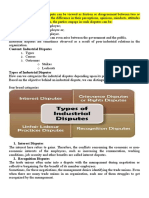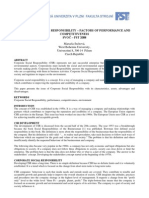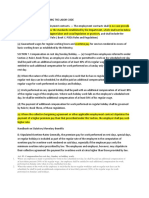Causes of Industrial Disputes
Causes of Industrial Disputes
Uploaded by
Hiral SoniCopyright:
Available Formats
Causes of Industrial Disputes
Causes of Industrial Disputes
Uploaded by
Hiral SoniOriginal Description:
Copyright
Available Formats
Share this document
Did you find this document useful?
Is this content inappropriate?
Copyright:
Available Formats
Causes of Industrial Disputes
Causes of Industrial Disputes
Uploaded by
Hiral SoniCopyright:
Available Formats
Causes of Industrial Disputes
1. Demand for Higher wages The employees want higher wages. The employer wants more profit by paying lower wages. This results in frustration among employees and they resort to agitation. Since the cost of living
index is increasing, workers generally bargain for higher wages to meet the rising cost of living index and to increase their standards of living
2. Non-Implementation of Bonus Schemes Bonus is a strong incentive for the employees. They want share in the profit in the form of bonus. However, the employers generally show deficit and do not pay bonus to the employees. This results in industrial dispute.
3. Demand for better working condition The employees want better working conditions. If their demand is not accepted by the employer they resort to agitational approach. The result is industrial disputes.
4. Failure to recognise Unions The employers cannot tolerate trade unions as they feel that these unions are threat to their profit. Therefore, they discourage union movement by the policy of divided and rule. But the workers believe in collective bargaining and desire the recognition of unions by the employers.
5. Demand for proper leave Rules The employers want that leave rules and working hours should as laid down in factory act. No worker should be forced to work more than 48 hours or more in a week. However, generally employers ignore these rules which results in industrial dispute.
6. Over Time Payment The employees demand over-time payment as prescribed in the factory act. But the employer either does not make any payment or makes under-payment. This causes frustration among employees and they resort to agitations.
7. Political Interference -
Most of the trade unions in India are dominated by political parties. Sometimes, political leaders use workers as tool for their selfish ends. They excite the workers to go on strike or adopt other agitational approach.
8. Punishment to Workers Sometimes, the employer adopts dictational policy and victimises the employers by suspending or dismissing them from services. In order to get the victimisation redressed the employees resort to agitational approach. This disturbs the industrial peace.
9. Mass retrenchment & undue promotions :One major cause of industrial dispute is the mass retrenchment and undue promotions of the employees. The employees start agitation to show their resentment against the callous attitude of the management.
10. Insecurity of Service In India, the employment opportunities are very tight. The employees want security of service. If the employer does not meet with their demand they adopt agitational approach.
11. Wrong policy or decision Sometimes, the policy or decision taken by the management is determental to the interests of employees. This causes frustration among the employees and they went to agitational approach in bid to put pressure on the management to withdraw the wrong decision.
12. Bad Behaviour The pre-requisite of industrial peace is the cordial relations between the employer and employees. If the behaviour of the management is bad towards the employees, good will disappears and dispute arises.
13. Non-redressal of grievances The employees place their grievances before the management time and again. If their genuine grievances are not removed or properly attended, it give rise to frustration and ultimately a dispute..,mxcz
You might also like
- Hijo Resources Corp Vs Epifanio Mejares Et Al (Digest)Document2 pagesHijo Resources Corp Vs Epifanio Mejares Et Al (Digest)Cristelle Elaine Collera100% (1)
- Industrial RelationsDocument6 pagesIndustrial RelationsSri LakshmiNo ratings yet
- SHRM (Unfair Labour Practices and Collective Bargaining)Document14 pagesSHRM (Unfair Labour Practices and Collective Bargaining)Manisha MishraNo ratings yet
- Vertical Marketing SystemsDocument1 pageVertical Marketing SystemsKarthikick PkNo ratings yet
- Abfrl About The Co. Info PDFDocument10 pagesAbfrl About The Co. Info PDFAshray AroraNo ratings yet
- Trade Union Act, 1926Document30 pagesTrade Union Act, 1926Ragavendra RagsNo ratings yet
- Ethical Issues in Marketing Mix & Unethical AdvertisingDocument24 pagesEthical Issues in Marketing Mix & Unethical Advertisingpiyushsingla.030No ratings yet
- Irll NotesDocument40 pagesIrll NotesMayank JainNo ratings yet
- Bipartite BodiesDocument2 pagesBipartite BodiesprincerattanNo ratings yet
- Regulatory Framework For Financial Services in IndiaDocument25 pagesRegulatory Framework For Financial Services in IndiaBishnu PhukanNo ratings yet
- Salesmanship: Unit - 3Document82 pagesSalesmanship: Unit - 3yatin rajputNo ratings yet
- Companies Act 1956Document14 pagesCompanies Act 1956buviaroNo ratings yet
- Securities Contracts (Regulation) Act, 1956Document5 pagesSecurities Contracts (Regulation) Act, 1956Papa PappaNo ratings yet
- 7 Payment of Bonus Act, 1Document25 pages7 Payment of Bonus Act, 1DeepakNo ratings yet
- Definition: An Industrial Dispute Can Be Viewed As Friction or Disagreement Between Two orDocument5 pagesDefinition: An Industrial Dispute Can Be Viewed As Friction or Disagreement Between Two orAmbreen Zaineb/Lecturer BKR/Economics and BANo ratings yet
- Assignment On Web of Rules and Ideologies of Industrial Relations & Trade UnionsDocument14 pagesAssignment On Web of Rules and Ideologies of Industrial Relations & Trade UnionsNishant JainNo ratings yet
- Case Study SubhikshaDocument3 pagesCase Study SubhikshapravinNo ratings yet
- Contract Act 1872 For MBADocument47 pagesContract Act 1872 For MBARavi Sharma0% (1)
- Factors That Contributed To Growth of Indian LeasingDocument5 pagesFactors That Contributed To Growth of Indian LeasingRAKESH SHARMA100% (3)
- MBA-Nayak PPT 1Document15 pagesMBA-Nayak PPT 1Anveshak PardhiNo ratings yet
- Aachi MasalaDocument8 pagesAachi MasalaPrabu EswaranNo ratings yet
- Business Environment With Reference To Global IntegrationDocument15 pagesBusiness Environment With Reference To Global IntegrationBhupendra ChauhanNo ratings yet
- Fdi in Retail Sector in IndiaDocument12 pagesFdi in Retail Sector in IndiaMi NkNo ratings yet
- The Contract Labour (Regulation and Abolition) Act, 1970: Presented By: Ajay Krishna S4 MbaDocument32 pagesThe Contract Labour (Regulation and Abolition) Act, 1970: Presented By: Ajay Krishna S4 Mbavaishu nairNo ratings yet
- Emerging Sectors in Indian EconomyDocument4 pagesEmerging Sectors in Indian EconomyManoj TiwariNo ratings yet
- Strikes and LockoutsDocument10 pagesStrikes and LockoutsShubham JainNo ratings yet
- Weakness of Indian Financial SystemDocument7 pagesWeakness of Indian Financial SystemAnonymous So5qPSnNo ratings yet
- Company Regulatory Legislations in IndiaDocument42 pagesCompany Regulatory Legislations in IndiaAngad SinghNo ratings yet
- The Payment of Wages ActDocument2 pagesThe Payment of Wages Actvai8havNo ratings yet
- Compensation & Reward Management: The Payment of Bonus Act, 1965Document9 pagesCompensation & Reward Management: The Payment of Bonus Act, 1965Unnati GalaNo ratings yet
- Unit-II Financial ServicesDocument20 pagesUnit-II Financial ServicesramamohanvspNo ratings yet
- The Oecd Principles of Corporate GovernanceDocument8 pagesThe Oecd Principles of Corporate GovernanceNazifaNo ratings yet
- Main Provisions of The Payment of Wages ActDocument7 pagesMain Provisions of The Payment of Wages ActPrashant Meena100% (1)
- Unit 3 Call Money MarketDocument14 pagesUnit 3 Call Money MarketsadathnooriNo ratings yet
- Bharat Engineering Works LTDDocument13 pagesBharat Engineering Works LTDKuldeep jajraNo ratings yet
- Influencing Compensation FactorsDocument10 pagesInfluencing Compensation Factorskingsley_psbNo ratings yet
- BR Unit 1 Notes PDFDocument63 pagesBR Unit 1 Notes PDFUdaya Raja100% (3)
- Entrepreneurship in India Scenario-Vol2no1 - 6 PDFDocument5 pagesEntrepreneurship in India Scenario-Vol2no1 - 6 PDFMahibul IslamNo ratings yet
- Participants in OTCEI MarketDocument7 pagesParticipants in OTCEI MarketAshu158No ratings yet
- IR Globalisation& IRDocument10 pagesIR Globalisation& IRSujit SekharNo ratings yet
- Greenbury Committee PresDocument19 pagesGreenbury Committee PresDeepesh YadavNo ratings yet
- SRP Project 2020Document67 pagesSRP Project 2020Monika ShindeyNo ratings yet
- Ratio Analysis Tirupati Cotton Mills LTDDocument102 pagesRatio Analysis Tirupati Cotton Mills LTDHarish Babu Gundla PalliNo ratings yet
- Basic Constitutional Provisions Regarding Regulation of Business in IndiaDocument11 pagesBasic Constitutional Provisions Regarding Regulation of Business in Indiamonirba48100% (1)
- VRS in Public Sector BanksDocument101 pagesVRS in Public Sector Banksnaziya123100% (7)
- Trade Union Act 1926Document5 pagesTrade Union Act 1926Avie Basota100% (1)
- Trade Union Act Objectives and FunctionsDocument11 pagesTrade Union Act Objectives and FunctionsMark Raju100% (1)
- Clpa Xii New Branches of AuditingDocument7 pagesClpa Xii New Branches of AuditingSARFARAZ AHMADNo ratings yet
- Consumer Behavior in ServicesDocument19 pagesConsumer Behavior in Servicesashishprk84100% (1)
- Case StudyDocument29 pagesCase StudyJay KaranNo ratings yet
- Security Analysis and Portfolio Management: Master of Business AdministrationDocument80 pagesSecurity Analysis and Portfolio Management: Master of Business AdministrationSagar Paul'gNo ratings yet
- Labour Law in NepalDocument8 pagesLabour Law in Nepalitsme_manju1No ratings yet
- Deemed IncomeDocument18 pagesDeemed IncomeVicky DNo ratings yet
- Submitted By: Swati Singh Submitted To: Dr. V. Shunmuga Sundaram SirDocument17 pagesSubmitted By: Swati Singh Submitted To: Dr. V. Shunmuga Sundaram Sirswatisin93No ratings yet
- Sebi Role and Functions of SEBI: 1. Protection of Investor's InterestDocument2 pagesSebi Role and Functions of SEBI: 1. Protection of Investor's InterestGurudatta JuvekarNo ratings yet
- Case: Kavery Limited: QuestionsDocument1 pageCase: Kavery Limited: QuestionsDhruv GandhiNo ratings yet
- Investigation into the Adherence to Corporate Governance in Zimbabwe’s SME SectorFrom EverandInvestigation into the Adherence to Corporate Governance in Zimbabwe’s SME SectorNo ratings yet
- Lesson 7 Labor Relations, Health and SafetyDocument8 pagesLesson 7 Labor Relations, Health and SafetyLovely Jean LopezNo ratings yet
- ILRDocument7 pagesILRshankruthNo ratings yet
- What Is Unfair Labor Practices Mean?Document6 pagesWhat Is Unfair Labor Practices Mean?yosefNo ratings yet
- Industrial RelationsDocument12 pagesIndustrial RelationsRoisinNo ratings yet
- Methods of Job Design Job RotationDocument5 pagesMethods of Job Design Job RotationHiral SoniNo ratings yet
- Collective BargainingDocument35 pagesCollective BargainingVishnu VardhanNo ratings yet
- Interview Dos and DontsDocument3 pagesInterview Dos and DontsHiral SoniNo ratings yet
- Interview Dos and DontsDocument3 pagesInterview Dos and DontsHiral SoniNo ratings yet
- Company MeetingsDocument5 pagesCompany MeetingsHiral Soni100% (1)
- Advantage and Disadvantage of CSRDocument5 pagesAdvantage and Disadvantage of CSRAuosh StarsNo ratings yet
- Project On Apollo Tyres LTD For PCRDocument92 pagesProject On Apollo Tyres LTD For PCRanand jai86% (14)
- Asia Pacific 2012 India Original Equipment Tire Customer Satisfaction Index StudyDocument5 pagesAsia Pacific 2012 India Original Equipment Tire Customer Satisfaction Index StudyHiral SoniNo ratings yet
- 07 - Process of Collective BargainingDocument18 pages07 - Process of Collective BargainingHiral SoniNo ratings yet
- Unit 3 Merchandise Management System (MMS) - I: StructureDocument8 pagesUnit 3 Merchandise Management System (MMS) - I: StructureHiral SoniNo ratings yet
- Human Resource Management in Knowledge Economy: InformationDocument27 pagesHuman Resource Management in Knowledge Economy: InformationHiral SoniNo ratings yet
- Case No. 20 0f 2008 Main OrderDocument126 pagesCase No. 20 0f 2008 Main Orderraghul_sudheeshNo ratings yet
- Cameroon EnglishDocument52 pagesCameroon Englishngummabel93No ratings yet
- Striking A Light Matchwomen's FestivalDocument2 pagesStriking A Light Matchwomen's FestivalThe History Workshop OnlineNo ratings yet
- Ballb Sem Vi Labour Law IDocument17 pagesBallb Sem Vi Labour Law Irajvi uwuNo ratings yet
- PHIMCO INDUSTRIES Vs PILADocument1 pagePHIMCO INDUSTRIES Vs PILAmblopez1No ratings yet
- Employee Counseling and Grievance HandlingDocument19 pagesEmployee Counseling and Grievance HandlingJunaisah Sharief Maupaat100% (1)
- Fair Work Information StatementDocument2 pagesFair Work Information StatementaNo ratings yet
- JD 236 FINAL EXAM - FuerzasDocument28 pagesJD 236 FINAL EXAM - Fuerzascarl fuerzasNo ratings yet
- An Overview of Labour Law in RwandaDocument12 pagesAn Overview of Labour Law in Rwandap pNo ratings yet
- Leave Application FormDocument2 pagesLeave Application FormThi HaNo ratings yet
- Chapter 1 QuizDocument3 pagesChapter 1 QuizGerard Peter MarianoNo ratings yet
- Automotive Engine Rebuilders, Inc. v. Progresibong Unyon NG Mga Manggagagawa Sa AERDocument2 pagesAutomotive Engine Rebuilders, Inc. v. Progresibong Unyon NG Mga Manggagagawa Sa AERMark AlfredNo ratings yet
- Employee Relations ManagementDocument8 pagesEmployee Relations ManagementAnonymous GuyNo ratings yet
- Uae Labour Law SummaryDocument28 pagesUae Labour Law SummaryJEAN SAGUANNo ratings yet
- Art. 93. Compensation For Rest Day, Sunday or Holiday WorkDocument2 pagesArt. 93. Compensation For Rest Day, Sunday or Holiday WorkAnonymous lokXJkc7l7No ratings yet
- Phil. Metal Foundries vs. CIR, G.R. No. L-34948-49 May 15, 1979Document5 pagesPhil. Metal Foundries vs. CIR, G.R. No. L-34948-49 May 15, 1979Joseph Raymund BautistaNo ratings yet
- Faculty - Business Management - 2023 - Session 1 - Degree - HRM581Document4 pagesFaculty - Business Management - 2023 - Session 1 - Degree - HRM581FARAIZAM AZUAN HAFIZ JAFFARNo ratings yet
- SYLLABUS Labor Relations and NegotiationsDocument17 pagesSYLLABUS Labor Relations and NegotiationsJoseph Cabrera100% (1)
- Time Off PolicyDocument4 pagesTime Off PolicyLiz Tan Pei YeeNo ratings yet
- Business Math Q4 Module 4 WK4Document10 pagesBusiness Math Q4 Module 4 WK4gabezarate071No ratings yet
- Objectives of Industrial LawDocument10 pagesObjectives of Industrial Lawanoos04No ratings yet
- BIFLEX Phils LU Vs Filflex IndustrialDocument4 pagesBIFLEX Phils LU Vs Filflex IndustrialJohnday MartirezNo ratings yet
- HRM Important Questions Sem 2Document2 pagesHRM Important Questions Sem 2Asfaq SumraNo ratings yet
- Labor 2 Reviewer-YapKDocument12 pagesLabor 2 Reviewer-YapKKrystoffer YapNo ratings yet
- Malaysia Employment Labour Law 2019Document12 pagesMalaysia Employment Labour Law 2019Alageswaran Tamil SelvanNo ratings yet
- Strikes ProjectDocument9 pagesStrikes ProjectshublaabhNo ratings yet
- Chapter 7 Pad363Document39 pagesChapter 7 Pad363Hazwan Md LazimNo ratings yet
- Case StudyDocument22 pagesCase Studyneetisom89% (9)
- G.R. No. L-50320Document2 pagesG.R. No. L-50320Princess de VeyraNo ratings yet
- IR in SLDocument4 pagesIR in SLShiwanthie WijesuriyaNo ratings yet




































































































